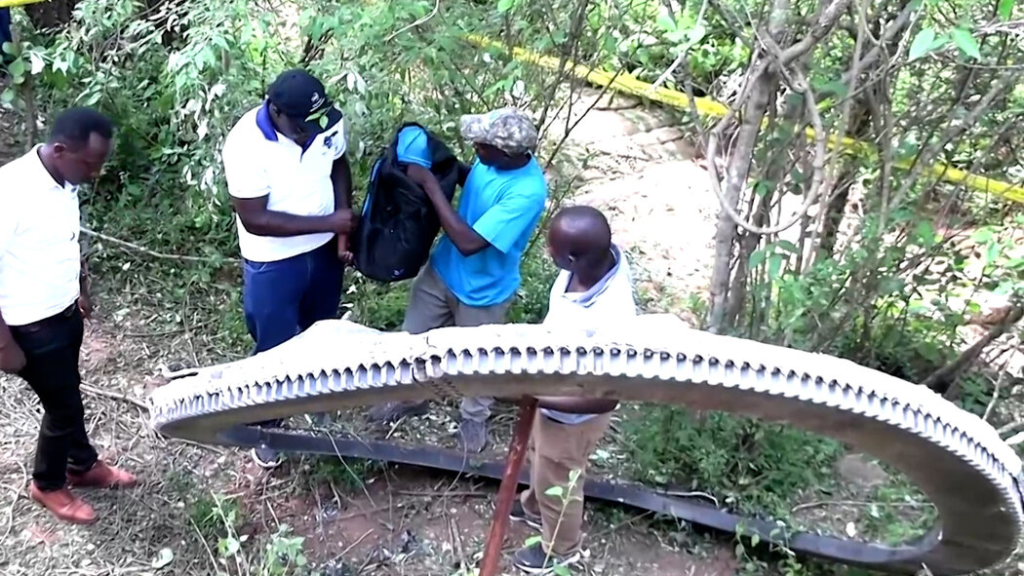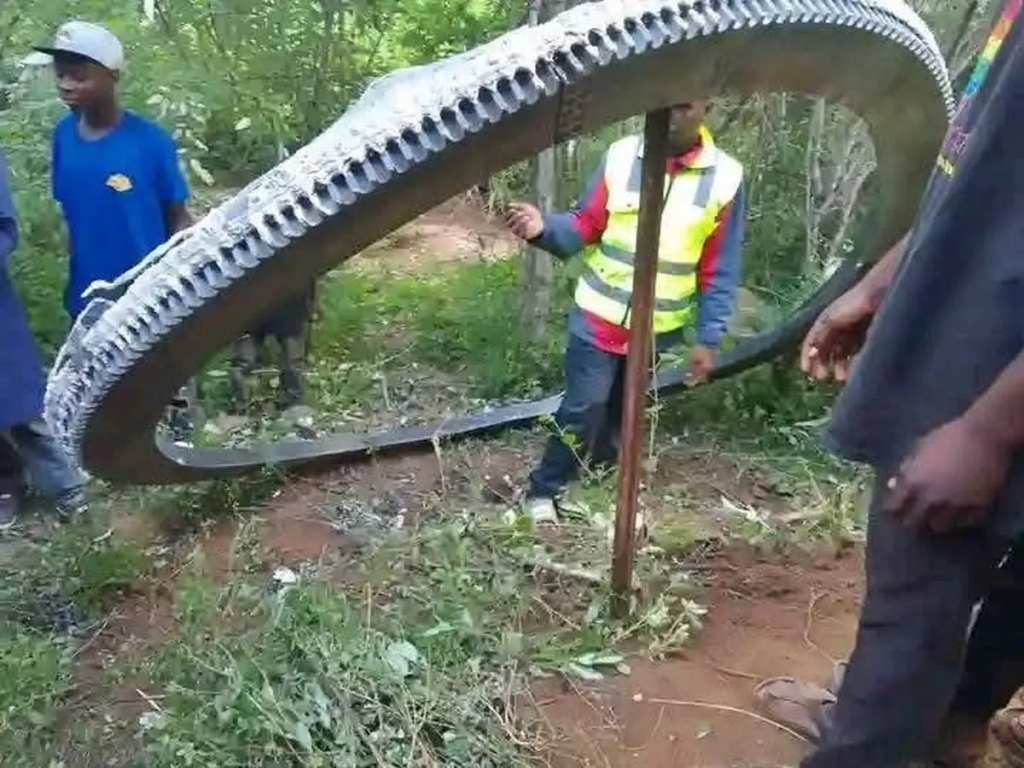In a strange and unnerving turn of events, a Metal Ring Falls from Sky into Mukuku village, located in Makueni county in southern Kenya, on December 30, 2024. The object, which weighed approximately 500 kg and spanned 2.5 meters (8 feet) in diameter, raised immediate safety concerns and sparked a wave of curiosity among locals.
Investigators believe that the metal ring is a fragment of a rocket, separated shortly after a launch. The incident highlights growing concerns over the rising volume of space debris and its potential threat to life on Earth.
Metal Ring Falls from Sky Into Mukuku Village
At around 3:00 pm local time (1200 GMT), the people of Mukuku village were taken aback by the sudden appearance of a metallic ring falling from the sky. The event was startling, with the massive object creating an immediate stir in the community. Locals rushed to the crash site to examine the debris and document the strange occurrence.
The discovery prompted immediate action by local authorities and officials from the Kenya Space Agency (KSA), who quickly cordoned off the area.
The metal ring, weighing 500 kg and measuring 2.5 meters in diameter, is believed to be a part of a rocket or satellite. According to preliminary assessments by the KSA, the ring likely separated from a rocket shortly after its launch.
This is a common phenomenon in space missions, as rockets shed various stages or components during their ascent. However, in most cases, these pieces are designed to either burn up upon re-entry into the Earth’s atmosphere or fall over uninhabited areas.
What makes this event more perplexing is that the metal ring landed in a populated area. While the object was not deemed a threat to public safety, as confirmed by KSA, the incident still raised alarms among the local population, who are not accustomed to such occurrences.
Read : Traffic in Space: Over 14,000 Satellites, 120 Million Pieces of Debris Crowding Earth’s Orbit Now
The piece’s heavy weight and size make it a rare case of space debris reaching the Earth’s surface and drawing significant attention from both the public and space experts.
Experts from the Kenya Space Agency and local authorities have been working together to secure the crash site and retrieve the debris for further analysis.
A metallic object, weighing approximately 500 kilograms and measuring 2 meters in diameter, crashed into Mukuku Village in Eastern Kenya, on December 30.
— BBC News Africa (@BBCAfrica) January 2, 2025
The Kenya Space Agency has reassured the public that the debris poses no immediate safety threat. pic.twitter.com/tLT2FmFIXu
The object’s origin is under investigation, with KSA officials closely examining the metal fragments to determine their source. This investigation is expected to shed light on the growing issue of space debris, which has become a significant concern in the age of commercial space exploration and frequent satellite launches.
Space Debris: The Growing Concern
This incident in Mukuku village is part of a larger, more alarming global trend: the increase in space debris. As more countries and private companies engage in rocket launches and satellite deployments, the amount of space debris orbiting the Earth has skyrocketed.
Space agencies, such as NASA and the European Space Agency (ESA), have long warned about the dangers posed by these objects. While most space debris, such as spent rocket stages and defunct satellites, are small and burn up upon re-entry, larger fragments like the one in Mukuku village can survive the atmosphere and pose a risk to human safety.
The metal ring that fell in Kenya is believed to be a separation ring from a launch vehicle. These separation rings are designed to detach from rockets once they reach a certain point in their trajectory, allowing the rocket to continue its ascent.
Ideally, these components are engineered to burn up upon re-entry into the Earth’s atmosphere or fall into uninhabited areas, where they will pose minimal risk to life and property. However, when these objects fall into populated regions, they can cause significant concern.
The Mukuku village incident has sparked renewed discussions about the risks associated with space debris. While the KSA has assured the public that the object was not a threat, it serves as a reminder of the increasing volume of space junk orbiting the Earth.

With more private companies, such as Elon Musk’s SpaceX, launching rockets and deploying satellites at an unprecedented rate, the likelihood of space debris impacting Earth is growing. The situation calls for urgent attention from global space agencies, governments, and international organizations to establish stricter regulations for the management of space debris.
Kenya’s experience with space debris is not unique. In 2022, a similar incident occurred when a part of Elon Musk’s SpaceX Dragon capsule fell on a sheep farm in Australia. Similarly, in 2024, NASA faced a lawsuit from an American family whose Florida home was struck by a piece of falling metal.
These incidents are becoming more frequent as the number of rockets launched into space increases, and the potential for damage to property or injury to humans grows.
The Role of the Kenya Space Agency and Local Authorities
The swift response from local authorities and the Kenya Space Agency (KSA) played a crucial role in managing the aftermath of the fallen metal ring.
Upon receiving reports from the villagers, the KSA immediately dispatched experts to secure the site and begin the investigation. The agency worked alongside local authorities to ensure that the area was cordoned off and that no further danger was posed to the public.
The KSA has expressed gratitude towards the local community for their prompt action in reporting the incident. This quick response allowed the authorities to take immediate steps to assess the situation and prevent any harm.
The KSA has assured the public that the object does not pose a threat to public safety and that investigations are underway to determine its origin. Preliminary assessments indicate that the object is a separation ring from a launch vehicle, which is designed to either burn up upon re-entry or fall over uninhabited areas.
In addition to securing the area and retrieving the debris, the KSA is working closely with other space agencies and experts to identify the exact source of the metal ring.

This investigation is expected to provide valuable insights into the growing issue of space debris and its potential impact on the Earth. The KSA has emphasized that this is an isolated incident, but it remains committed to addressing the issue of space debris and preventing similar occurrences in the future.
While the KSA has acted swiftly in this case, the incident raises broader questions about the management of space debris and the need for global cooperation in addressing the problem.
As more countries and private companies venture into space, the risks associated with space debris will only increase. It is imperative that international guidelines and regulations be developed to ensure that space exploration does not come at the expense of safety on Earth.
The Future of Space Exploration and Space Debris Management
As the world moves further into the era of commercial space exploration, the issue of space debris will continue to grow in prominence.
With private companies like SpaceX and Blue Origin launching rockets at a rapid pace, the accumulation of space debris is becoming a significant challenge. While most space agencies have systems in place to track and manage space debris, the current regulatory framework is not sufficient to address the increasing volume of objects in orbit.
The Mukuku village incident serves as a wake-up call for the global community to take action. While space exploration holds immense potential for scientific discovery and technological advancement, it also comes with risks.

In order to mitigate these risks, it is essential for space-faring nations and private companies to collaborate on solutions for space debris management. This could involve developing technologies to remove debris from orbit, implementing stricter regulations on satellite launches, and creating systems to monitor and track debris more effectively.
The role of organizations like the United Nations Office for Outer Space Affairs (UNOOSA) will be crucial in facilitating global cooperation on space debris management. Through diplomatic channels and international treaties, space-faring nations must work together to create a sustainable framework for space exploration that prioritizes both innovation and safety.
The Mukuku village incident in Kenya serves as a stark reminder of the potential dangers posed by space debris. While the metal ring that fell into the village was not a direct threat, it highlights the need for continued vigilance and collaboration to ensure that space exploration does not compromise the safety of life on Earth.
As space exploration continues to expand, it is crucial that global efforts focus on mitigating the risks associated with space debris and developing solutions to protect both space infrastructure and those living on Earth.

